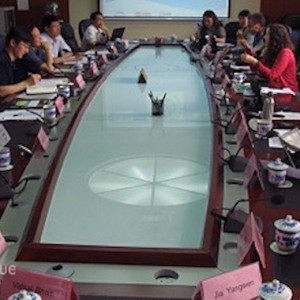Federal Water Tap, August 12: $US 400 Million Pipeline in Colorado
Water Supply
The Bureau of Reclamation released a final environmental impact statement for a $US 400 million water pipeline project in southeastern Colorado. The Arkansas Valley Conduit includes roughly 365 kilometers (227 miles) of pipeline plus upgrades to an existing water treatment plant in order to supply 40 towns and water systems currently serving 52,000 people. The water would replace poor quality groundwater currently being used. The federal government will pick up 65 percent of the cost. Local ratepayers will have 50 years to pay back the rest.
Project water would be stored in Pueblo reservoir. In conjunction with the environmental review, the U.S. Geological Survey studied how the project would change the reservoir’s water quality and found it would have little effect.
Evergreens, Going Away
A warming world and the water deficits it brings will push out tree species and give rise to a landscape of shrubs and grasses in western North America, according to a paper in the Journal of Climate. Needleleaf evergreens may decline by half, with most of the changes coming later this century. Several researchers from the U.S. Geological Survey and Los Alamos National Laboratory contributed to the study.
Estuaries and Climate Change
The people who live near estuaries on the Gulf Coast and West Coast are more at risk from the physical alteration of estuaries due to climate change than those on the East Coast, according to the National Estuarine Research Reserve System. Most climate studies look at changes in the natural world, but this analysis assessed social effects by taking demographics into account. Areas with high employment in resource extraction, low per-capita income, less education, and higher concentrations of Latinos and American Indians were at higher risk from altered estuaries.
Biofuels
The U.S. Environmental Protection Agency indicated that it might relax its biofuels standard next year, Bloomberg reports. The standard has been criticized for driving up demand for corn and increasing gasoline prices.
Groundwater Contamination
Wells in different parts of an aquifer have unique levels of risk for contamination because of the different sources of water that filter through the ground and the different chemical compositions of the rock structures, according to research from the U.S. Geological Survey. Some 100 million people in the United States get their water from public water wells.
Missouri River
The Army Corps of Engineers will prepare an environmental impact statement for the Missouri River recovery program. The program’s goal is to manage and restore the river to protect endangered species. Public comments on the scope of the environmental review are being taken through October 18 and can be submitted via the above link.
Effects of Hurricane Sandy
A committee that advises the Army Corps of Engineers on coastal resources will hold a public meeting to discuss the effects of Hurricane Sandy. Taking place September 4-6 in Long Branch, New Jersey, the meeting will focus on water infrastructure, coastlines, and ecosystem restoration to build resiliency. To attend, email Jeffrey.R.Eckstein@usace.army.mil.
Federal Water Tap is a weekly digest spotting trends in U.S. government water policy. To get more water news, follow Circle of Blue on Twitter and sign up for our newsletter.
Brett writes about agriculture, energy, infrastructure, and the politics and economics of water in the United States. He also writes the Federal Water Tap, Circle of Blue’s weekly digest of U.S. government water news. He is the winner of two Society of Environmental Journalists reporting awards, one of the top honors in American environmental journalism: first place for explanatory reporting for a series on septic system pollution in the United States(2016) and third place for beat reporting in a small market (2014). He received the Sierra Club’s Distinguished Service Award in 2018. Brett lives in Seattle, where he hikes the mountains and bakes pies. Contact Brett Walton






Leave a Reply
Want to join the discussion?Feel free to contribute!